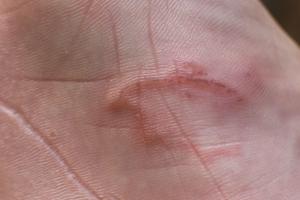Worms in humans
Some types of worms can infect people. Some can be caught in Northern Ireland and others are only caught abroad. Most worm infections aren't serious and can be easily treated with medicine.
How a pharmacist can help
A pharmacist can help if you have:
- small, white worms in your poo that look like pieces of thread
- extreme itching around your anus, particularly at night
This is probably threadworms.

They're common in Northern Ireland and can be treated with medicine from a pharmacy.
When to see your GP
You should see your GP if you:
- find a large worm or large piece of worm in your poo
- have a red, itchy worm-shaped rash on your skin
- have sickness, diarrhoea or a stomach ache for longer than 2 weeks
- are losing weight for no reason



These could be symptoms of something like roundworm, hookworm or tapeworm.
These infections are usually caught while travelling. They can take a long time to cause symptoms, so tell your GP if you've been abroad in the last two years.
It doesn't matter which type of worm you have – all worm infections are treated in a similar way.
Treatment to get rid of worms
You might be asked to give a sample of poo so it can be tested for worm eggs.
If you have worms, your GP will prescribe medicine to kill them. You take this for one to three days. The people you live with may also need to be treated.
Any worms in your gut will eventually pass out in your poo. You may not notice this.
To avoid becoming infected again or infecting others, it's very important during the weeks after starting treatment to wash your hands:
- after going to the toilet
- before eating or preparing food
- regularly during the day
Important
Go back to your GP if your symptoms don't get better in two weeks or you keep passing live worms in your poo.
How you catch worms
Worms are mainly spread in small bits of poo from people with a worm infection. Some are caught from food.
You can get infected by:
- touching objects or surfaces with worm eggs on them if someone with worms doesn't wash their hands
- touching soil or swallowing water or food with worm eggs in it – mainly a risk in parts of the world without modern toilets or sewage systems
- walking barefoot on soil containing worms – only a risk in parts of the world without modern toilets or sewage systems
- eating raw or undercooked beef, pork or freshwater fish (like salmon or trout) containing baby worms – more common in parts of the world with poor food hygiene standards
You can catch some worms from pets, but this is rare.
How to prevent worm infections
Do
- wash your hands before eating or preparing food, and after touching soil or using the toilet
- only drink bottled or boiled water in high-risk areas (places without modern toilets or sewage systems)
- de-worm pet dogs and cats regularly
- dispose of dog and cat poo in a bin as soon as possible
- thoroughly wash garden-grown fruit and vegetables
Don't
- let children play in areas where there's a lot of dog or cat poo
- eat raw fruit and vegetables in high-risk areas
- walk barefoot in high-risk areas
- eat raw or undercooked pork, beef or freshwater fish
More useful links
The information on this page has been adapted from original content from the NHS website.
For further information see terms and conditions.